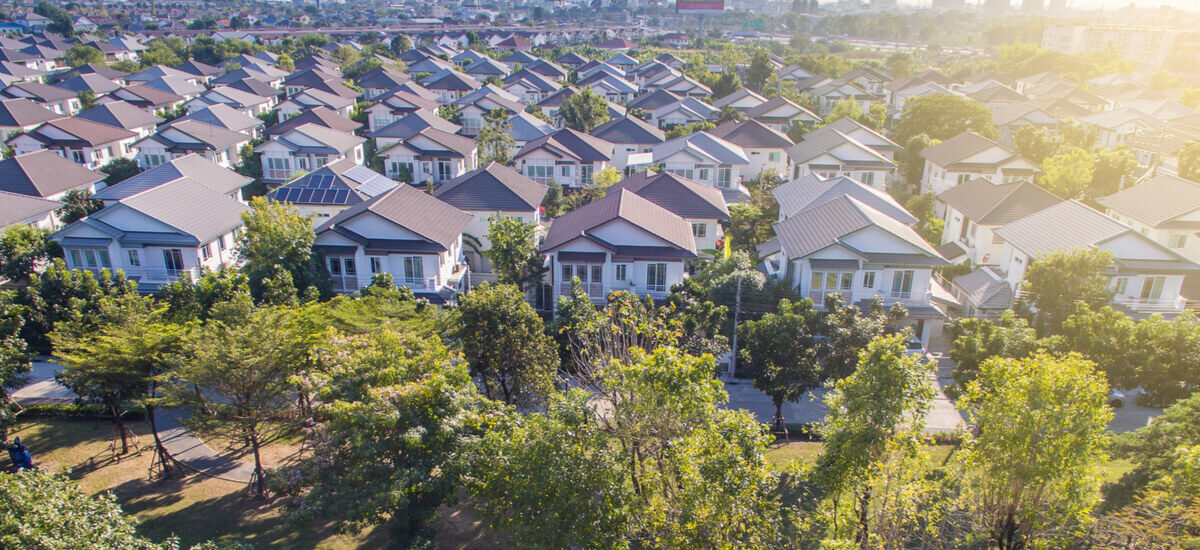How much is a security deposit? 2025 guide
Everything you need to know about security deposits

If you’re thinking of moving to Thailand the first natural step you’ll need to take is finding a place to live.
Though there are restrictions on foreign property ownership, competitive prices make it inviting for expats. You just have to be aware of the local regulations to make your Thai dream home a reality.
So read along for all you need to know about buying property in Thailand for foreigners.
With Covid-19 interfering with the economy — seen by a decrease on exportations and slowing down on tourism — it’s natural that the housing market isn’t on it’s best shape¹.
This is mostly seen by the drops in property demand and construction — which lead to prices to keep falling.
Though the scenario doesn’t seem inviting, the Thai government is incentivizing foreign investment. Projects approved by the Board of Investment allow buyers to purchase up to 17,000 square feet — with an investment of at least 40mi THB.
If you’re looking to purchase property abroad, Thailand is still an option to be considered.
US citizens can buy property in Thailand — though there are restrictions for what type of property can be purchased by foreigners².
It’s possible for non-residents to buy condos and apartments, as long as the unit owners in the building remain 60% Thai. Another concession for buyers that are not native to Thailand is to buy a whole building — though, the land on which it was built cannot be owned.
This is due to the fact that foreigners — wherever they are from — are not allowed to buy land in Thailand. The only way around this is through setting up a private limited company that is partly owned by a local.
When you buy property in Thailand, you can register with the local Land Office a 30-year lease for the land in which your house or apartment stands. Conditions apply for this type of contract, so make sure you’ve read up on the regulations before making any commitments.
If you wish to explore the alternatives of land ownership, reach out to a local lawyer to assist you.

Buying property in Thailand can feel different to purchasing a home in the US. There’s less regulations on the housing market and you’ll be liable for more checks to make sure you’re dealing within legal parameters.
Once you’ve set your budget and secured your mortgage — either with a local Thai bank or through an international mortgage lender in the US — these are the steps you’ll have to follow²:
Step 1. Hire a lawyer to help you with the purchase process, as the real estate industry isn’t regulated yet.
Step 2. The lawyer should conduct the necessary due diligence on the property.
Step 3. Once you’ve made an offer which was accepted by the seller, his or her lawyer will draw up the purchase agreement. In this document it should be included who will pay for the legal and transfer fees, as well as taxes — besides the regular conditions of purchase.
Step 4. When signing the contract, you should pay the 10% deposit. Keep in mind that this amount isn’t refundable, except if the seller is the one backing out.
Step 5. You should close the contract — a process that can take one to two months to be completed — and pay the remainder amount.
Step 6. The lawyer will then register the title deeds with the competent Land Department — at which time the government duties will have to be paid.
Step 7. Sit back and enjoy your new Thai home! 🎉
If you’re looking for real estate abroad, you might be wondering how to send money to pay for your overseas property. Wise offers you a quick, safe and transparent solution for sending money to Thailand.
You get the mid-market exchange rate for your payments and see how much it’s charged for the transfer before sending the money from your bank.
With the Wise Multi-currency Account you can also hold, send and spend money in over 50 countries, and receive like a local in 10 different currencies.
Create a free Wise account in minutes and save up to 6x compared to your bank.
As in many other countries and regions, how much a house costs in Thailand will vary depending on where you wish to live and the type of property you’re looking for.
The highest fares will be found in large cities, such as the capital — Bangkok. Smaller expat hubs, such as Chiang Mai and Koh Samui, offer cheaper pricing options. Popular tourist destinations can have a range of different prices, depending on what you’re looking for.
Don’t forget to do your research to find the place that suits your budget. Here are some average prices for you to get started:
| City | Price (sqft) in city center | Price (sqft) outside of city center |
|---|---|---|
| Bangkok³ | 463.03 USD | 217.18 USD |
| Chiang Mai⁴ | 187.46 USD | 115.68 USD |
| Koh Samui⁴ | 96.17 USD | 54.95 USD |
| Hua Hin⁵ | 178.59 USD | 147.00 USD |
| Phuket⁵ | 176.73 USD | 168.29 USD |
Most of the property purchase costs are covered by the seller. Keep these in mind if you ever wish to sell your house in Thailand:
| Fee² | Amount (%) |
|---|---|
| Agent/Agency fee | 3% - 5% |
| Withholding tax | 1% |
| Stamp duty | 0.5% |
| Specific business tax | 3.3% |
| Registration fee | 2% |
When it comes to the buyer, the only fees you’ll have to pay are:
- Transfer fee, which ranges from 0.01% to 2.00%;
- Legal fees, which can be negotiated with the seller;
- Exchange rates, which vary according to the provider you’ll use to send money to Thailand.
|
|---|
Save on international payments

As the real estate sector in Thailand isn’t regulated, it’s recommended that you use a local property agent you can trust. This way you’ll have someone to help you navigate the local regulations.
Add into this a very different system of arranging the deeds of ownership, and buying a home in Thailand without qualified local help can be problematic.
A specialist agent can also offer helpful advice and insight into the local market and even help you with the local language.
Although, there will be a fee to pay for this service, they'll help you with avoiding costly mistakes. Nonetheless, you should make sure you’re clear on what you’ll get for your money, as both the packages and prices vary wildly.
| 🏡 Some property websites to kickstart your research |
|---|
You'll have a wide choice of apartments, condos and houses in Thailand — although you face some restrictions when purchasing as a foreign buyer.
If you’re a foreigner buying property in Thailand, you can buy condos and apartments, as long as the ownership of the block remains mostly local. Naturally, you'll find more flats available in built up areas and cities, with condos being the most popular housing type in Bangkok by a long way.
As mentioned before, you cannot own land in Thailand, so if you wish to build a home yourself, it’s better to consult a lawyer to check your alternatives.
You can also lease land on a long term lease, and build a home. It's possible for example, to make a 30 year lease and then build. The contract can then be renewed for another 30 years or sold if you want to leave.
Though it’s not a requirement, before you make any commitments, you can get a survey done on the chosen property or land you wish to buy/lease.
As this isn’t necessarily the norm when it comes to buying property in Thailand, it’s worth asking your lawyer about how to find a local surveyor you can trust.
To avoid scams and pitfalls, it’s recommended to ask locals for advice and broker suggestions.
Keep in mind that the real estate sector isn't regulated in Thailand, which means that the quality of agents varies significantly — so make sure you do your research before closing any deals.
When diving into the property market in Thailand, take this guide as your starting point.
There’s no doubt you’ll find a wonderful property in Thailand — and if you do your research and source the right local help you could have your dream home in no time.
And for all your international transfer needs, don’t forget to create a Wise Account, this way you’ll have one less thing to worry about when settling on your new Thai home!
Sources:
Sources checked on 12.22.2021
*Please see terms of use and product availability for your region or visit Wise fees and pricing for the most up to date pricing and fee information.
This publication is provided for general information purposes and does not constitute legal, tax or other professional advice from Wise Payments Limited or its subsidiaries and its affiliates, and it is not intended as a substitute for obtaining advice from a financial advisor or any other professional.
We make no representations, warranties or guarantees, whether expressed or implied, that the content in the publication is accurate, complete or up to date.

Everything you need to know about security deposits

Learn all about different ways to get an overseas property mortgage as an American and gain unique insights to prepare yourself for the whole process.

Get a full overview of the best property management software systems for small landlords to easily track and manage their overseas property.

How to buy your first rental property overseas? Here's a detailed guide that can help you understand the challenges and steps for making an investment.

What are the best property management software systems for managing student housing? Take a look at our list and choose the most suitable option for you.

Are you thinking about making smart property investment decisions and wondering how rental yield is calculated? Have a look at our guide to find out.